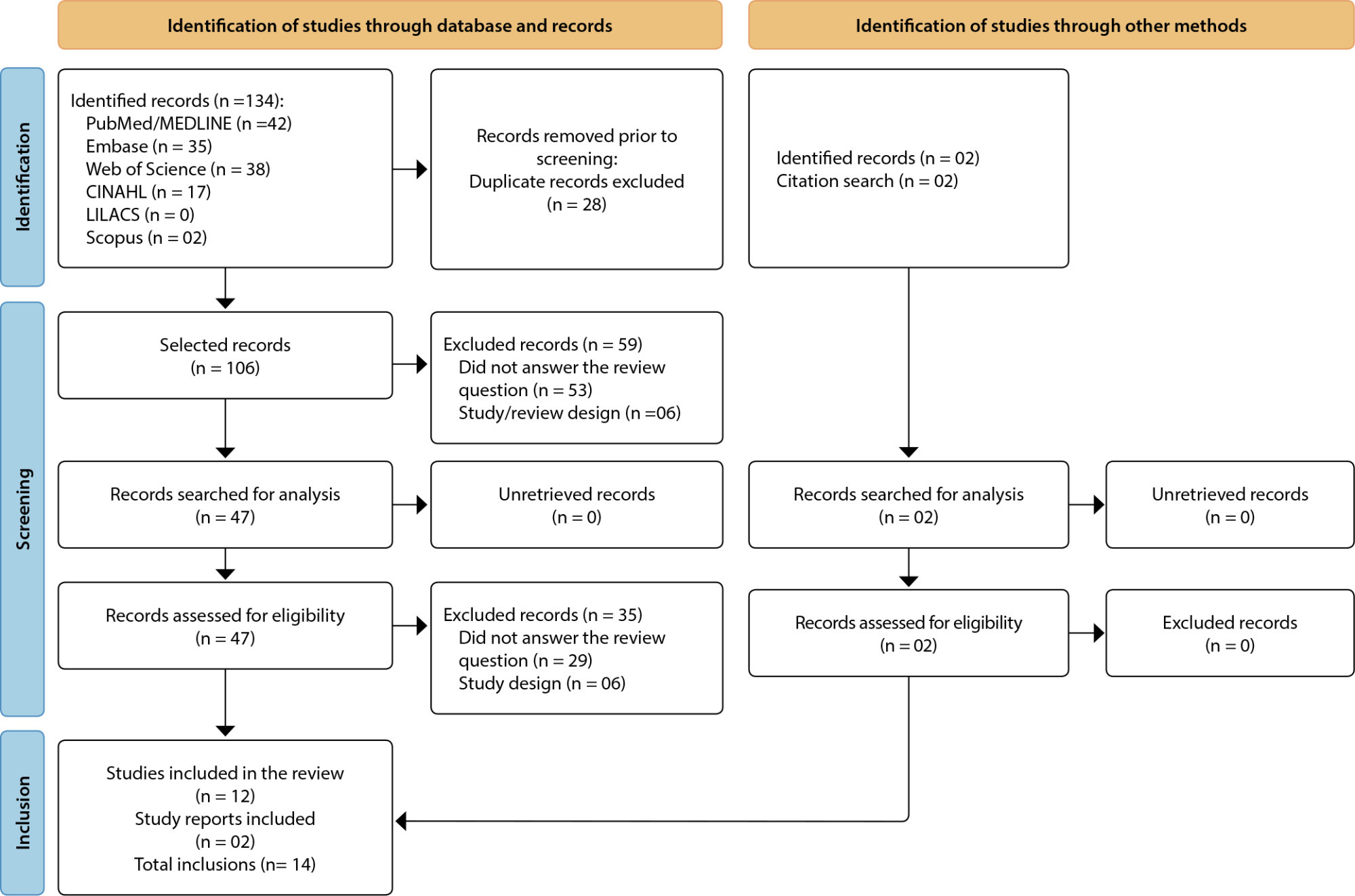-
ORIGINAL ARTICLE
Effect of cardiovascular biofeedback on nursing staff stress: a randomized controlled clinical trial
Revista Brasileira de Enfermagem. 2023;76(6):e20230069
12-04-2023
Abstract
ORIGINAL ARTICLEEffect of cardiovascular biofeedback on nursing staff stress: a randomized controlled clinical trial
Revista Brasileira de Enfermagem. 2023;76(6):e20230069
12-04-2023DOI 10.1590/0034-7167-2023-0069
Views0See moreABSTRACT
Objective:
to assess the effect of cardiovascular biofeedback on nursing staff stress when compared to an activity without self-monitoring.
Method:
a randomized controlled clinical trial, carried out with nursing professionals from a university hospital. The intervention group (n=58) performed cardiovascular biofeedback, and the control (n=57) performed an online puzzle without self-monitoring, totaling nine meetings over three weeks. The outcome was assessed using the Stress Symptoms and Work-Related Stress scales, and the biological marker heart rate variability. The generalized estimating equations method was used.
Results:
the intervention had no effect on self-reported instruments (p>0.050). However, there was an effect of time (p<0.050) on all heart rate variability indicators, demonstrating changes over the sessions.
Conclusion:
cardiovascular biofeedback showed promising results in the biological marker, suggesting that it can be used in nursing staff as a complementary therapy by promoting better autonomic nervous system regulation.

-
Transition of Care for Individuals with Mental Disorders in Brazil: A Contextual Analysis
Revista Brasileira de Enfermagem. 2023;76(6):e20230063
12-04-2023
Abstract
Transition of Care for Individuals with Mental Disorders in Brazil: A Contextual Analysis
Revista Brasileira de Enfermagem. 2023;76(6):e20230063
12-04-2023DOI 10.1590/0034-7167-2023-0063
Views0See moreABSTRACT
Objective:
To describe the contexts of care transition for individuals with mental disorders in the Brazilian setting.
Methods:
A contextual analysis was conducted through a scoping review. The search for studies was conducted in databases and thesis and dissertation portals, and the analysis was based on immediate, specific, general, and meta-contexts.
Results:
The sample, consisting of eight studies, indicated that the following factors are present in the contexts where care transition occurs: Peculiarities of care transition for individuals with mental disorders; Perspectives that can strengthen or weaken this transition; Approaches proposed in the past for the development of care transition; and Elements related to Brazilian legislation.
Final Considerations:
It is observed that the transition of care for individuals with mental disorders in Brazil takes place in various contexts of care levels. These variations present significant potentials and barriers in the care scenarios.
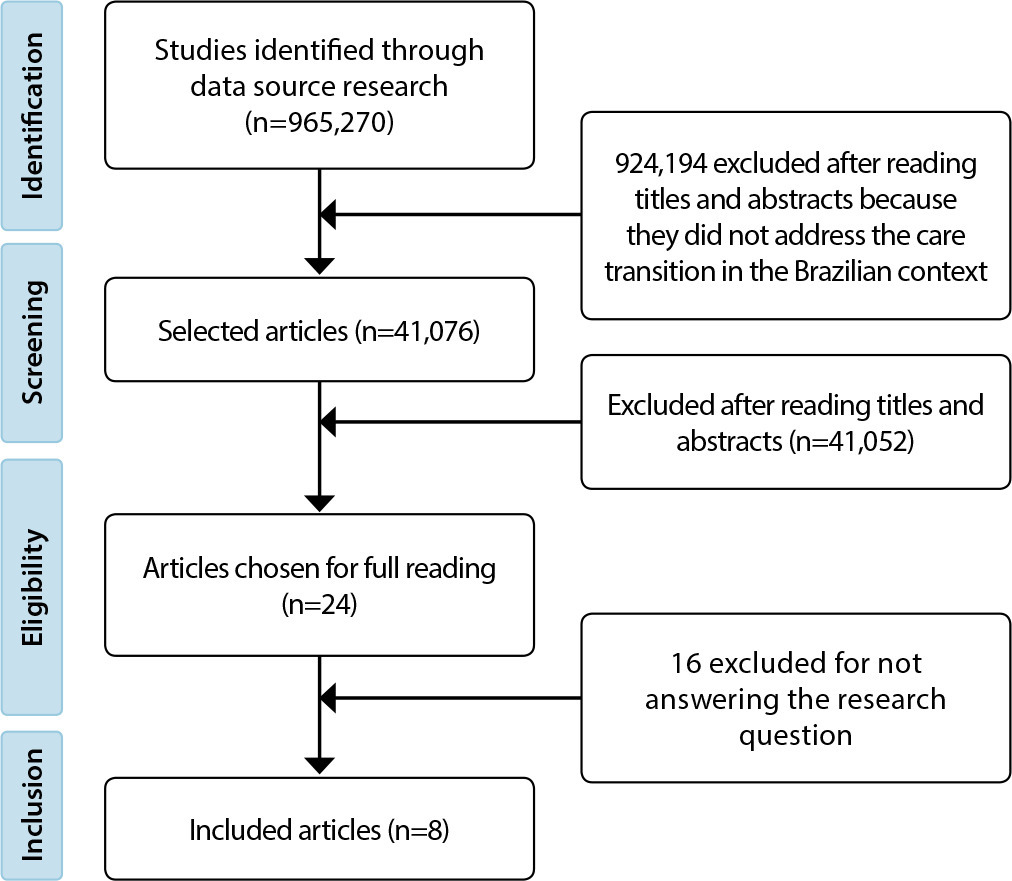
-
ORIGINAL ARTICLE
Sexual behavior according to undergraduate students: perspective of cross-cultural nursing and intersectional framing
Revista Brasileira de Enfermagem. 2023;76(6):e20220786
12-04-2023
Abstract
ORIGINAL ARTICLESexual behavior according to undergraduate students: perspective of cross-cultural nursing and intersectional framing
Revista Brasileira de Enfermagem. 2023;76(6):e20220786
12-04-2023DOI 10.1590/0034-7167-2022-0786
Views0ABSTRACT
Objective:
to discuss undergraduate students’ sexual behavior from the perspective of social markers and cross-cultural care proposed by Madeleine Leininger.
Methods:
descriptive-exploratory qualitative research, with a theoretical-philosophical foundation in the Transcultural Theory. Convenience sample was composed of 57 young people from two universities in Rio de Janeiro. The focus groups’ content were analyzed lexically using the IRAMUTEQ software.
Results:
four classes emerged: Young people’s sexual scripts: between the fear of an unplanned pregnancy and the risk of exposure to sexually transmitted infections; Affective relationships: trust in steady sexual partners, apparent sense of security and disuse of condoms; Sexual practices, gender and cultural determinants: distinction in men’s and women’s role; Sexual partnerships, negotiation of condom use and vulnerability to sexually transmitted infections.
Final considerations:
challenges are perceived for the attention to undergraduate students’ sexual health, who verbalized risky sexual behaviors due to sociocultural vulnerabilities.
Keywords:Cross-Cultural NursingIntersectional FramingSexual BehaviorSexually Transmitted InfectionsYoung AdultSee more
-
Sleep quality of nurses who worked in coping with COVID-19: an integrative review
Revista Brasileira de Enfermagem. 2023;76(6):e20230007
12-04-2023
Abstract
Sleep quality of nurses who worked in coping with COVID-19: an integrative review
Revista Brasileira de Enfermagem. 2023;76(6):e20230007
12-04-2023DOI 10.1590/0034-7167-2023-0007
Views0See moreABSTRACT
Objective:
to analyze sleep quality of nurses who worked coping with COVID-19 in scientific evidence.
Methods:
an integrative review, carried out in seven databases, including studies between December 2021 and June 2022, without language restrictions. The sample consisted of 15 primary studies.
Results:
nurses working in hospital, intensive care, outpatient care and teaching institutions constitute a vulnerable group for sleep disorders: latency, duration, efficiency and quality. The disorders identified involved insomnia at varying levels of severity: daytime dysfunction and morning sleepiness. Night work and low capacity for self-care were determinants of impaired sleep patterns.
Final considerations:
the COVID-19 pandemic contributed to greater vulnerability of nurses to changes in sleep, requiring strategies for risk management and well-being promotion.

-
ORIGINAL ARTICLE
Work and Mental Distress among Nurses in the Amazon Region of Brazil during the COVID-19 Pandemic
Revista Brasileira de Enfermagem. 2023;76(6):e20220792
12-04-2023
Abstract
ORIGINAL ARTICLEWork and Mental Distress among Nurses in the Amazon Region of Brazil during the COVID-19 Pandemic
Revista Brasileira de Enfermagem. 2023;76(6):e20220792
12-04-2023DOI 10.1590/0034-7167-2022-0792
Views0See moreABSTRACT
Objective:
To assess the relationship between psychopathological symptoms and the social, clinical, and occupational profile of nurses in the Amazon region of Brazil during the COVID-19 pandemic.
Methods:
A descriptive cross-sectional online study was conducted in 2020 with 261 nurses. The Symptom Assessment Scale-40 was utilized.
Results:
The presence of pre-existing conditions before the pandemic was associated with psychotism (p=0.044). Experiencing constraints and/or violence at work during the pandemic was associated with somatization (p=0.025), and working hours were associated with anxiety (p=0.025). Nurses predominantly exhibited symptoms related to fear (33.7%), tension (34.5%), and a sense that something is wrong in the mind (22.6%).
Conclusions:
A significant association was observed between working hours and anxiety symptoms, the experience of constraints and/or violence at work during the COVID-19 pandemic and somatization symptoms, as well as between pre-existing conditions and psychotism symptoms related to COVID-19.
-
Simulation training of caregivers at hospital discharge of patients with chronic diseases: an integrative review
Revista Brasileira de Enfermagem. 2023;76(6):e20230043
12-04-2023
Abstract
Simulation training of caregivers at hospital discharge of patients with chronic diseases: an integrative review
Revista Brasileira de Enfermagem. 2023;76(6):e20230043
12-04-2023DOI 10.1590/0034-7167-2023-0043
Views0See moreABSTRACT
Objective:
to identify evidence about the use and effects of clinical simulation for preparing caregivers for discharging patients with chronic conditions.
Methods:
an integrative peer review in the Scopus, PubMed, Web of Science, Cumulative Index to Nursing and Allied Health Literature, ScienceDirect and Virtual Health Library databases, from July to September 2022.
Results:
3,218 studies were identified, with a final sample consisting of four national and two international articles. Using simulation as an educational technology contributed to caregiver preparation in home care. In most studies, using clinical simulation included using other strategies to complement training: expository dialogued class, conversation circle and audiovisual resources.
Final considerations:
simulation proved to be efficient for training caregivers, with the active participation of family members and nurses in health education actions.
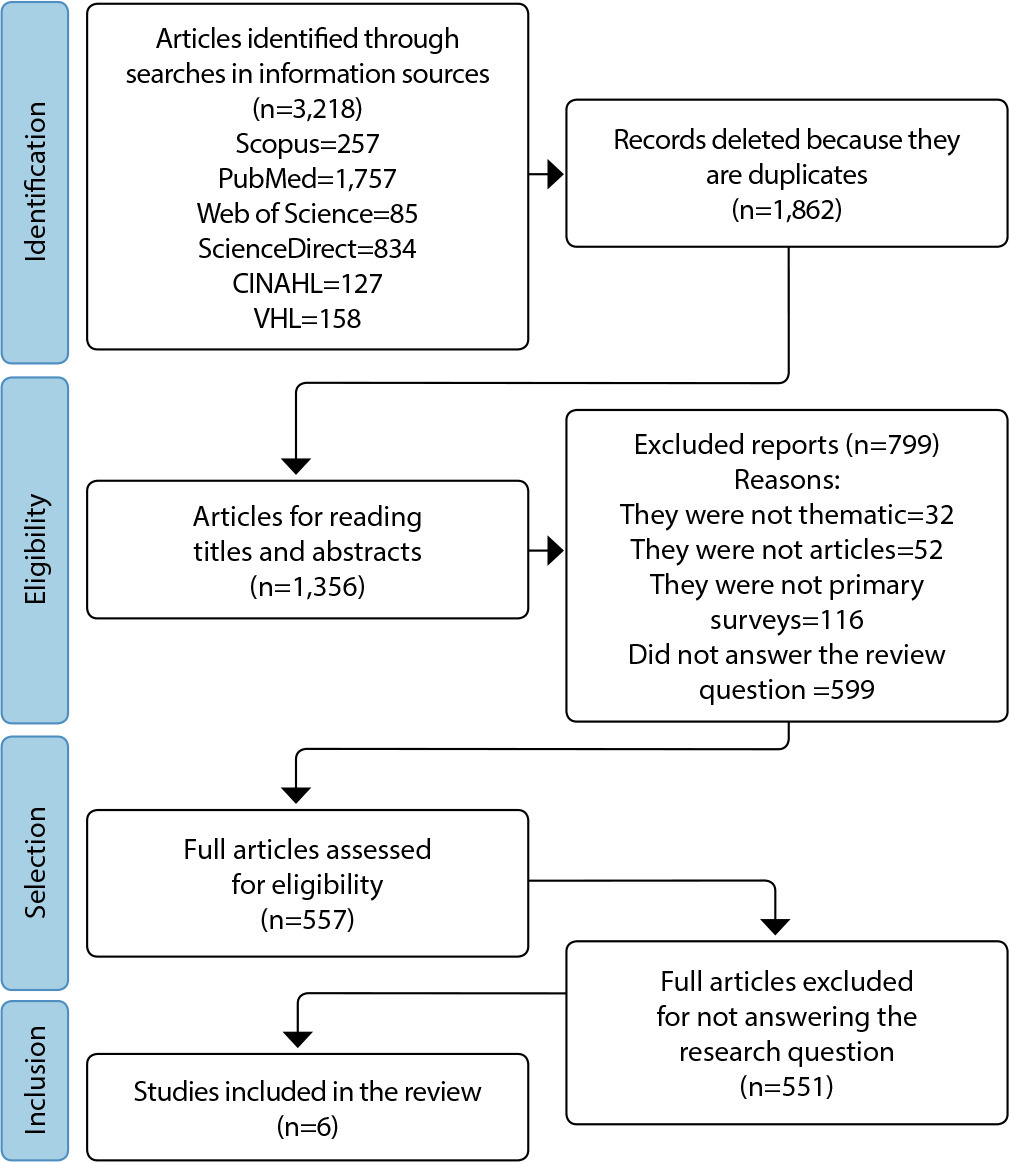
-
ORIGINAL ARTICLE
Feelings about birth by a group of high-risk pregnant women
Revista Brasileira de Enfermagem. 2023;76(6):e20230059
12-04-2023
Abstract
ORIGINAL ARTICLEFeelings about birth by a group of high-risk pregnant women
Revista Brasileira de Enfermagem. 2023;76(6):e20230059
12-04-2023DOI 10.1590/0034-7167-2023-0059
Views0See moreABSTRACT
Objective:
to understand feelings about birth among a group of high-risk pregnant women.
Method:
a descriptive and qualitative study, using Alfred Schütz’s social phenomenology as a philosophical theoretical framework. The study included 25 pregnant women undergoing high-risk prenatal care. The interview had the following guiding questions: tell me about your feelings regarding the moment of birth/childbirth; How do you deal with the high-risk diagnosis? What are your expectations for birth/childbirth?
Results:
five categories emerged: Fear of obstetric care; Fear of complications with the baby; Fear of cesarean section; Resilience in the face of high-risk pregnancy; and Expectations for birth.
Considerations:
high-risk pregnant women are afraid of the care they will receive, the risks and concern about the baby’s vitality at birth. The importance of care is emphasized, with a welcoming environment, bonding and communication between health team and pregnant woman.
-
ERRATUM
ERRATUM
Revista Brasileira de Enfermagem. 2024;77(1):e2024n1e01
01-15-2024
Abstract
ERRATUMERRATUM
Revista Brasileira de Enfermagem. 2024;77(1):e2024n1e01
01-15-2024DOI 10.1590/0034-7167.20247701e01
Views1In the article “The ethics of nursing care for transgender people”, with DOI number: , published in Revista Brasileira de Enfermagem, 2023;76(Suppl 3):e20220797, in authorship:Where it read:[…]See more -
ORIGINAL ARTICLE
The nursing practice environment and hospital sociotechnical complexity: a mixed-methods study
Revista Brasileira de Enfermagem. 2024;77(6):e20230315
12-16-2024
Abstract
ORIGINAL ARTICLEThe nursing practice environment and hospital sociotechnical complexity: a mixed-methods study
Revista Brasileira de Enfermagem. 2024;77(6):e20230315
12-16-2024DOI 10.1590/0034-7167-2023-0315
Views1See moreABSTRACT
Objectives:
to analyze the relationship between the nursing practice environment and hospital sociotechnical complexity as perceived by nurses.
Methods:
a sequential explanatory mixed-methods study was conducted in a hospital in southern Brazil. The Brazilian version of the Practice Environment Scale-Nursing Work Index and the Complexity Characterization Questionnaire were administered to 132 nurses. Subsequently, semi-structured interviews were conducted with 18 participants, and the data were subjected to thematic analysis. Data integration was achieved through a connection approach.
Results:
the nursing practice environment was found to be favorable, except in the subscale concerning Staffing and Resource Adequacy, where complexity was present in the activities. The three emerging categories explained human and technical aspects related to complexity in the practice environment, quality of care, and patient safety. Unexpected variability was inversely correlated with the practice environment.
Conclusions:
the study results indicate a relationship between these constructs, with implications for the quality and the safety of care.

-
REVIEW
Recommendations for guidelines for promoting mental health in the workplace: an umbrella review
Revista Brasileira de Enfermagem. 2024;77(6):e20240086
12-16-2024
Abstract
REVIEWRecommendations for guidelines for promoting mental health in the workplace: an umbrella review
Revista Brasileira de Enfermagem. 2024;77(6):e20240086
12-16-2024DOI 10.1590/0034-7167-2024-0086
Views1See moreABSTRACT
Objectives:
to summarize the recommendations of guidelines for promoting mental health in the workplace.
Methods:
an umbrella review, according to Joanna Briggs Institute and Preferred Reporting Items for Systematic reviews and Meta-Analyses methodological assumptions. Data collection was carried out in January 2021 and updated in July 2023 in the American Psychological Association, Cochrane Library, EMBASE, National Library of Medicine, and Scopus databases. Systematic reviews that assessed guidelines with recommendations for mental health care for workers were included. PROSPERO registration CRD42023461845.
Results:
four systematic reviews published between 2015 and 2018 were identified. The abstracts highlighted actions that facilitate and inhibit the recommendations as well as three categories of intervention: primary prevention – worker protection; secondary prevention – promoting workers’ mental health; and tertiary prevention – supporting, monitoring and rehabilitating workers upon returning to work.
Conclusions:
the interventions are based on prevention, promotion and early recognition, support and rehabilitation of mental health problems.

-
ORIGINAL ARTICLE
Effect of educational video on newborn care for the knowledge of pregnant and postpartum women and their families
Revista Brasileira de Enfermagem. 2022;75:e20201371
11-10-2022
Abstract
ORIGINAL ARTICLEEffect of educational video on newborn care for the knowledge of pregnant and postpartum women and their families
Revista Brasileira de Enfermagem. 2022;75:e20201371
11-10-2022DOI 10.1590/0034-7167-2020-1371
Views0See moreABSTRACT
Objectives:
to evaluate the effect of educational video on newborn care to increase the knowledge of pregnant, postpartum, and family members.
Methods:
a quasi-experimental study, with pre-intervention and post-intervention evaluation with a single group. Fifty-eight pregnant, postpartum, and family members treated in basic health units and a hospital in Ceará, Brazil, participated. The study used the McNemar and binomial tests for the analysis.
Results:
after the intervention, there was an increase in the frequency of hits, from 70.82% to 92.97%. Most of the questions presented a significant increase of hits (p < 0.05) with an emphasis on sleeping position, drying of clothes, free demand for breastfeeding, and things to avoid (such as accessories in the sleeping place and talc in diaper change).
Conclusions:
the educational video was effective to participants in acquiring knowledge on the care of newborns and can assist in health education activities carried out by nurses.
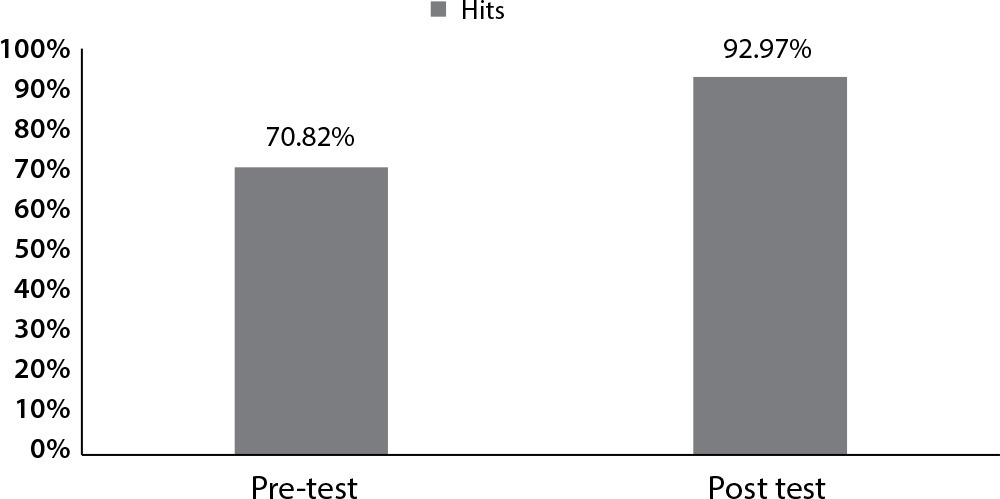
-
EDITORIAL
Monkeypox: between precision public health and stigma risk
Revista Brasileira de Enfermagem. 2022;75(5):e750501
08-01-2022
Abstract
EDITORIALMonkeypox: between precision public health and stigma risk
Revista Brasileira de Enfermagem. 2022;75(5):e750501
08-01-2022DOI 10.1590/0034-7167.2022750501
Views0The World Health Organization (WHO) is on alert due to an unprecedented Monkeypox outbreak in non-endemic countries, such as Europe, which have been affected recently. Despite the low pandemic potential, the recent SARS-CoV-2 pandemic has contributed to heightened levels of public concern in the face of the threat of new global health emergencies().As of May […]See more -
ORIGINAL ARTICLE
Clinical simulation in teaching Pediatric Nursing: students’ perception
Revista Brasileira de Enfermagem. 2020;73(2):e20180720
03-30-2020
Abstract
ORIGINAL ARTICLEClinical simulation in teaching Pediatric Nursing: students’ perception
Revista Brasileira de Enfermagem. 2020;73(2):e20180720
03-30-2020DOI 10.1590/0034-7167-2018-0720
Views0See moreABSTRACT
Objectives:
to comprehend the perception of undergraduate nursing students about learning to care for the child and family through clinical simulation.
Methods:
this is a qualitative research conducted with ten nursing students through semi-structured interviews. Data were analyzed through content analysis.
Results:
data were organized into two categories: “learning a new way to learn,” in which students describe their experiences during the simulation, and “learning a new way to care,” in which they reflect on learning through simulation.
Final considerations:
we believe that clinical simulation practice in teaching should be encouraged because of the benefits it can offer to the students, faculty, patients and their families. However, we recommend further studies to validate scenarios of child and family healthcare.
-
ORIGINAL ARTICLE
Transitional care from hospital to home for older people: implementation of best practices
Revista Brasileira de Enfermagem. 2020;73:e20200187
11-02-2020
Abstract
ORIGINAL ARTICLETransitional care from hospital to home for older people: implementation of best practices
Revista Brasileira de Enfermagem. 2020;73:e20200187
11-02-2020DOI 10.1590/0034-7167-2020-0187
Views0See moreABSTRACT
Objective:
to assess the conformity of nursing care concerning best evidence in transitional care from hospital to home for older people.
Methods:
a project to implement best evidence based on the model proposed by the Joanna Briggs Institute in surgical clinic of a university hospital with older people, caregivers or family members, and nurses, between July and August 2019. Eight evidence-based criteria have been audited through interviews, medical records and computerized system, presented in percentages.
Results:
the highest non-compliance rate found in a baseline audit was absence of continued training on transitional care and hospital discharge plan. Identifying barriers to best practices included educational programs; afterwards, there was an improvement in compliance rates in all the criteria assessed.
Final considerations:
the criteria based on audited evidence showed an increase in compliance rates with the strategies implemented, contributing to improving transitional care for older people.

-
ORIGINAL ARTICLE
Methodological path to reach the degree of saturation in qualitative research: grounded theory
Revista Brasileira de Enfermagem. 2022;75(2):e20201379
10-18-2022
Abstract
ORIGINAL ARTICLEMethodological path to reach the degree of saturation in qualitative research: grounded theory
Revista Brasileira de Enfermagem. 2022;75(2):e20201379
10-18-2022DOI 10.1590/0034-7167-2020-1379
Views0See moreABSTRACT
Objectives:
to achieve the degree of saturation in study that applied the grounded theory.
Methods:
qualitative research, carried out in four Family Health Units, between June 2018 and May 2019. The data from the interviews with 30 health professionals and non-participant observation were coded in the stages: open, axial and integration.
Results:
the degree of saturation was achieved by two conceptual models – theoretical saturation and inductive thematic. Theoretical saturation was considered: the development of conceptual codes and observation, in the collection and analysis of data, when they generated new categories/subcategories or only indicated increasing instances. For thematic inductive saturation, the use of new codes based on each interview stood out.
Final Considerations:
the visual layout for the number of codes, the theoretical scope of the concepts and the delimitation of the sample groups guided the identification of the degree of saturation for the development of the conceptual body that supported the substantive theory.
-
ORIGINAL ARTICLE
Practice challenges in patient safety
Revista Brasileira de Enfermagem. 2019;72(6):1504-1511
10-21-2019
Abstract
ORIGINAL ARTICLEPractice challenges in patient safety
Revista Brasileira de Enfermagem. 2019;72(6):1504-1511
10-21-2019DOI 10.1590/0034-7167-2018-0441
Views0See moreABSTRACT
Objective:
to understand the professional practice challenges in reaching the goals and objectives of the National Patient Safety Program (Programa Nacional de Segurança do Paciente).
Method:
qualitative case study, based on the Comprehensive Sociology, carried out with 31 professionals from the Patient Safety Center (Núcleo de Segurança do Paciente) and the nursing team, working in a teaching hospital. Data collection took place between May and December 2015 through interviews, observation and documentary analysis. The analysis proceeded according to the prerogatives of the Content Analysis.
Results:
three categories emerged: the prescribed reality; material resources and their impact on care; and human resources related to the reality.
Final considerations:
challenges to safe professional practice are caused by inadequate physical structure, insufficient physical and human resources, but mainly invade the transition from the prescriptive reality scope.
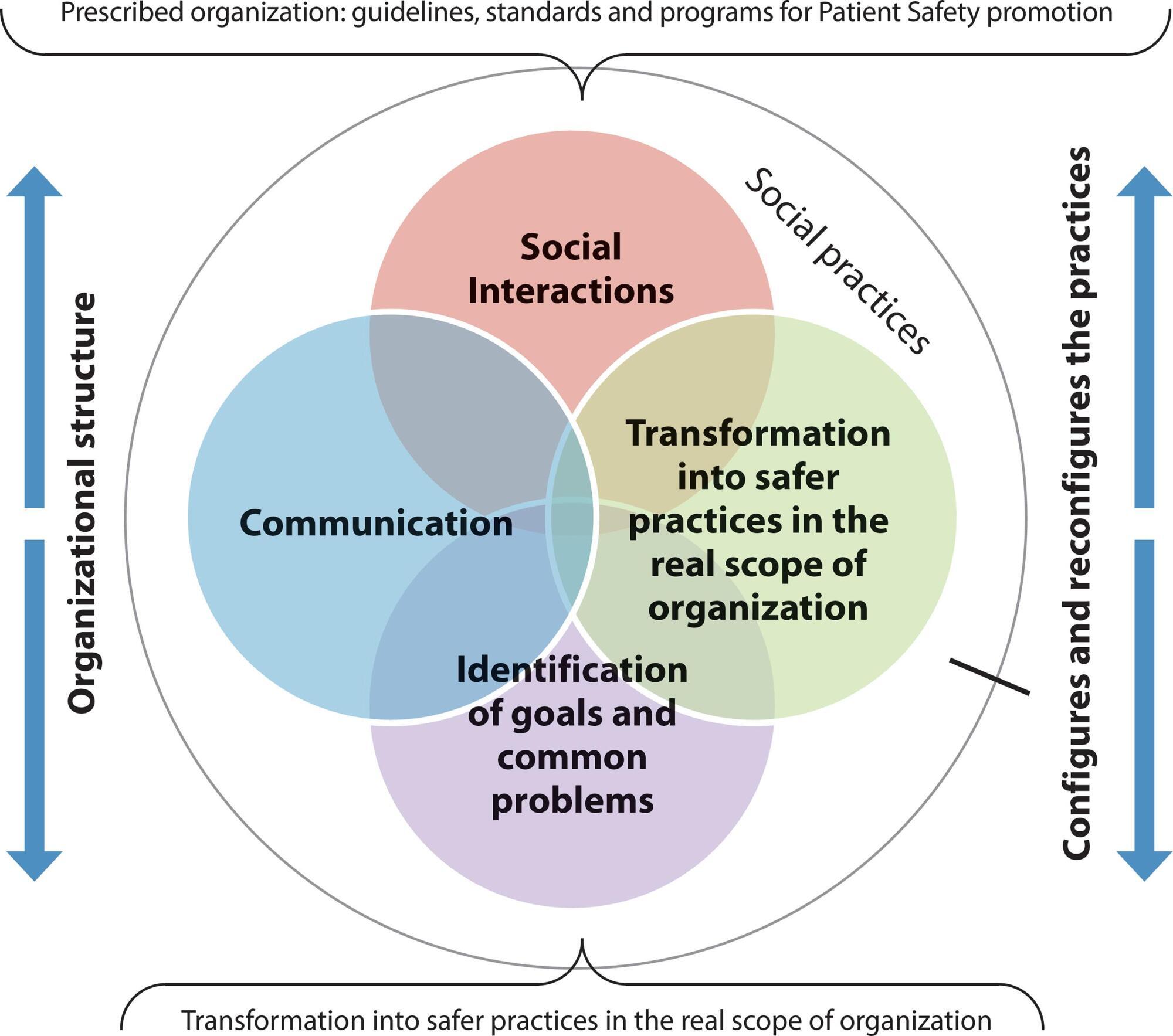
-
RESEARCH
Nurses in the labor market: professional insertion, competencies and skills
Revista Brasileira de Enfermagem. 2017;70(6):1220-1226
01-24-2017
Abstract
RESEARCHNurses in the labor market: professional insertion, competencies and skills
Revista Brasileira de Enfermagem. 2017;70(6):1220-1226
01-24-2017DOI 10.1590/0034-7167-2016-0061
Views0See moreABSTRACT
Objective:
to characterize nurses graduated from the School of Nursing of the University of São Paulo, from 2006 to 2012; verify their entry, facilitating factors and difficulties of these graduates in the labor market and to consider their skills and competences in the world of work.
Method:
an exploratory, descriptive study with a qualitative approach.
Results:
out of 505 graduates, 172 (34.1%) participated in the research. Entry into the labor market was mainly via public hospital institutions, in the SE of Brazil, in the caregiving sectors. The greater part remained from one to two years in their first job. Most agreed that they were prepared to meet the health needs of the population. Furthermore, they had been encouraged to seek systematic and continuous improvement in a critical, reflexive and creative way, while combining technical-scientific knowledge and personal skills.
Conclusion:
the results show that the University of São Paulo has been preparing nurses for work in the labor market, in accordance with the provisions of the National Curricular Guidelines.
Search
Search in:
Nuvem de Tags
Aged (144) Atenção Primária à Saúde (239) COVID-19 (104) Cuidados de Enfermagem (269) Educação em Enfermagem (151) Educação em Saúde (139) Enfermagem (930) Estudos de Validação (131) Health Education (144) Idoso (208) Mental Health (149) Nursing (987) Nursing Care (306) Patient Safety (151) Primary Health Care (284) Qualidade de Vida (104) Quality of Life (106) Saúde Mental (145) Segurança do Paciente (150) Validation Studies (108)




